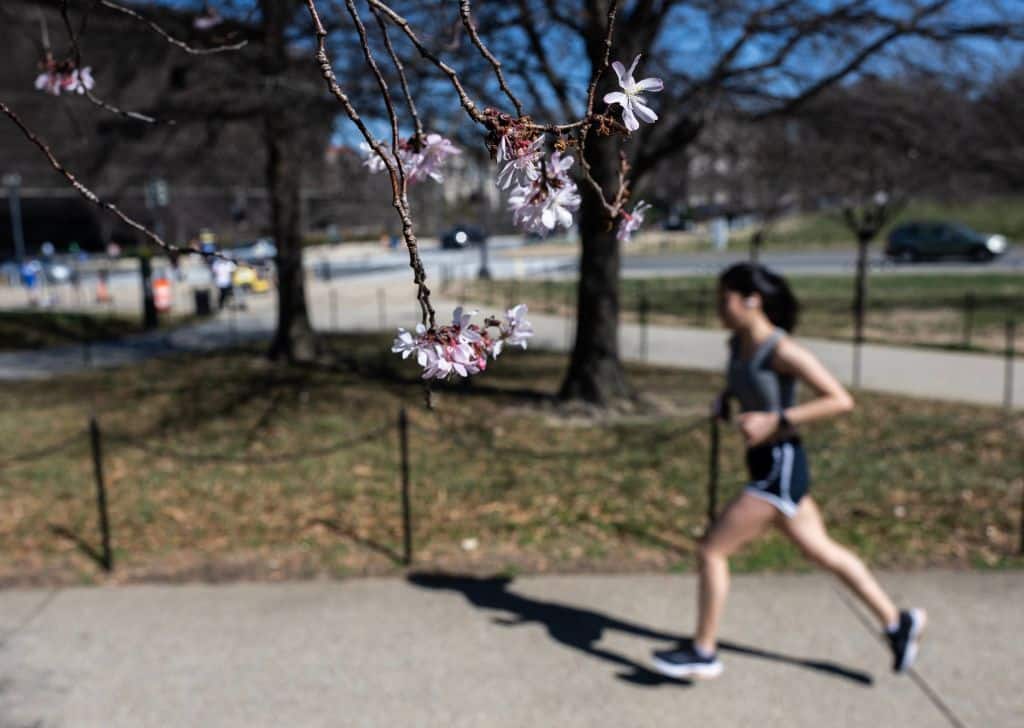Products You May Like
A person dons summer attire for Washington, D.C.’s warmest Feb. 23 on record. ANDREW CABALLERO-REYNOLDS / AFP / Getty Images
 Why you can trust us
Why you can trust us
Founded in 2005 as an Ohio-based environmental newspaper, EcoWatch is a digital platform dedicated to publishing quality, science-based content on environmental issues, causes, and solutions.
The weather in the U.S. has been a study in contrasts this week. While Seattle, Washington experienced its coldest Feb. 24 on record, Washington, D.C. saw its warmest ever Feb. 23.
In fact, locations across the East coast saw temperatures this week closer to the average for spring or early summer, raising concerns about how the climate crisis is altering the rhythm of the seasons.
“It’s a little unsettling, it’s certainly something that is out of the bounds of when we’d normally expect spring,” National Phenology Network Director and University of Arizona environmental scientist Teresa Crimmins said, as The Guardian reported. “It perhaps isn’t surprising, given the trajectory our planet is on, but it is surprising when you live through it.”
Phenology is the study of the seasons, so the National Phenology Network has plenty to study this year. According to the network, spring conditions have arrived at least 20 days before normal in many parts of the U.S. East and Southeast. In parts of central Texas, south-east Arkansas, southern Ohio and Maryland, those conditions have arrived at the earliest date on record. This is also the case for New York, where spring is 32 days early.
What does this mean exactly? It means that daffodils and violets are blooming in New York City, lilacs are blooming in Pennsylvania and the capital’s famous cherry blossoms have started to bud.
The National Mall division of the National Park System announced on Twitter Thursday that the famous Yoshino cherry trees had entered the first of six bloom stages with the emergence of green buds.
The last time the trees budded so early was in 2008 on Feb. 19, The Washington Post reported.
In addition to early blooms, the early spring weather brought record temperatures for the day Thursday, with the high temperature at Reagan National Airport reaching 81 degrees, which is only the fourth time that D.C. has hit the 80 degree mark in February. Overall, Jan. 1 through Wednesday is D.C.’s warmest start to the year.
More From EcoWatch
Hundreds of other warm records were set in the east this week, as The Washington Post reported further. These included a record February high of 81 degrees for Atlanta, a February and winter record of 77 degrees for Beckley, West Virginia and a whopping 102 degrees in Falcon Lake, Texas, which is the warmest temperature recorded so far in 2023 and one of the warmest ever recorded in the lower 48 states by this time of year.
At the same time, the U.S. West saw extreme cold, with Lyman, Wyoming, reaching negative 35 degrees. The usually mild West Coast experienced snow and ice, with Seattle recording a Feb. 24 low of 22 degrees, as King 5 News reported. Portland, Oregon, meanwhile, experienced its heaviest snowfall on record to occur so late, as KGW8 reported. And the Los Angeles National Weather Service issued a rare blizzard warning.
While the unseasonable warmth of the East might be more pleasant than the unusual cold of the West, it raises concerns about how seasons are shifting as global temperatures warm. Plants can bloom too early for their insect pollinators and birds might head north too early and starve when the food hasn’t kept pace with them, The Guardian pointed out. Ultimately, the risk to pollinators threatens the entire food system.
“I’m seeing the trends I rely upon, the calendar I have trusted to see rare plants in bloom, just completely disappear,” the Maryland/ D.C. chapter of the Nature Conservancy Director of Ecological Management Dr. Deborah Landau told The Guardian. “Everything has been thrown out of whack, species that have evolved together for millennia are now off-kilter. There is this cascading effect on everything that is more than just a missed cherry blossom season.”
Subscribe to get exclusive updates in our daily newsletter!
By signing up, you agree to the Terms of Use and Privacy Policy & to receive electronic communications from EcoWatch Media Group, which may include marketing promotions, advertisements and sponsored content.
